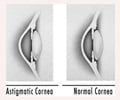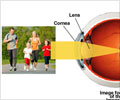Contact lenses are a better option than surgical lens replacement therapy in babies with congenital cataract, according to a recent insight.

Since the 1970s, contact lenses have been the standard way of treating aphakia (surgical lens removal to treat cataract), they said.
"Their use during infancy, however, can be challenging owing to problems with insertion and removal of lenses by parents, lens loss, difficulties with fitting the steep corneas of infants and compliance problems. These factors among others probably contribute to the poor visual outcome of many children with unilateral aphakia," wrote the authors.
In recent years, the technology to surgically implant a lens directly into the eye (intraocular lens) has improved considerably, noted the authors.
Dr. Scott R. Lambert, of Emory Eye Center, Atlanta, and colleagues in the Infant Aphakia Treatment Study Group compared visual outcomes and adverse events among 114 infants (median or midpoint age at surgery, 1.8 months) randomly assigned to receive either an intraocular lens or contact lens after cataract surgery.
The rate of complications during surgery was 16 of 57 (28 percent) in the intraocular lens group and six of 57 (11 percent) in the contact lens group.
Advertisement
"Thus, there appears to be no short-term visual benefit and some increased risk to implanting intraocular lenses in infants. However, since there remains a possibility that intraocular lenses may be found to be beneficial after a longer follow-up, we feel it would be premature to recommend that intraocular lenses not be implanted in infants," wrote the authors.
The study has been published in the July print issue of Archives of phthalmology, one of the JAMA/Archives journals.
Source-ANI
SAV










